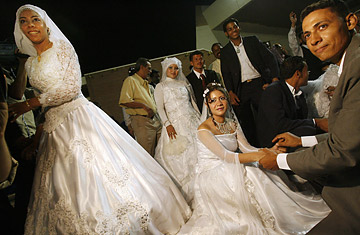
Egyptian couples dance during their collective wedding organized by Karme el-Islam association at a hall in Cairo.
Dr. Heba Kotb is running late for her daily Cairo clinic. Her patients, men and women, thumb indifferently through society magazines, carefully avoiding any eye contact with one another. The clinic is cheerful and warm, brightly decorated in shades of yellow and blue, and the only clue to the nature of her practice is the title of her book, on display in the waiting room: For Adults Only.
The attractive 40-year-old Egyptian mother of three daughters was originally a surgeon specializing in forensic medicine, but today she runs a growing practice as the only sexologist in Egypt, and probably the entire Arab world — which she reaches via two discussion shows on satellite TV. Veiled and pious, Kotb talks frankly to mostly conservative Arab men and women about such taboo subjects as how to make love, how to kindle desire and why regular sex is so important for a healthy marriage.
Kotb rushes through the door glancing at her watch, elegantly dressed in a burgundy and black suit, a matching silk headscarf and trendy black boots. Apologizing for being late, she sips her tea and nibbles on a cookie — no time for lunch — as she passionately discusses the profession into which she stumbled by chance. Having abandoned her dream of becoming a surgeon after the birth of her first daughter in the mid-'90s, she searched for a new interest to help her through what she recalls as "the darkest period of my life."
In the course of pursuing a masters degree, she became fascinated by the problem of child sexual abuse. "I was so naive I had no idea that sexual abuse even existed," she says. "Growing up and as a student nobody had ever discussed this subject with me." Kotb began extensive research on sexuality, realizing that "I was in total dimness." In the course of her French education and in her relatively liberal household, the topic of sexuality had simply been taboo.
Kotb soon discovered a similar level of ignorance when discussing such matters among her peers, and found it odd that so little was known about such a vital subject — despite the fact that sexuality is extensively discussed in the Koran. She later completed a Ph.D. by correspondence on the topic "Sexuality in Islam," explaining that sexual gratification within marriage is an important component of Islam.
And when she opened a private practice seven years ago, she found her compatriots receptive to her message. She offers separate group courses for men and women at the clinic, and private courses and consultations for couples. "Couples come and tell me that they feel something is wrong about their sexuality," she says. Her therapeutic response is influenced in part by the duration of the marriage. Kotb also counsels patients on questions of masturbation and homosexuality (although she treats the latter as an "unnatural" impulse to be "treated"), but refuses to take on any cases involving sexual relations outside of marriage. "This is a solid part of my practice." When she started her practice, her patients were almost exclusively women from Cairo's social elite. Today, her clinic is visited by people from different social strata, and by a growing number of men.
Not even the Islamic morality that guides her practice is enough for some critics, however. In newspapers and on TV talk shows, conservative Islamic scholars have accused her of encouraging young people to experiment with sex. "This is unrealistic," she counters, "because the youth experiment anyway, but based on wrong information and misconceptions." And that brings suffering to their family and society. "I don't mind being criticized, but I wish someone would criticize me to my face," she stresses. "I am very proud of what I am doing. I am not ashamed."
On TV, Kotb does not cringe from answering any questions asked by viewers, because she believes that she has the scientific background to discuss any sexual issue. The gratification in her work, she says, comes from making couples happier by helping resolve their marital sex problems. But she refuses to deal with cases where a husband abuses his wife but expects her to respond to his sexual whims by claiming that Islam requires her obedience. "I ask patients like that to leave and never come back, because they are an insult to Islam and the Prophet," she says.
Her $40 fee for a 20-minute consultation is pretty high by local medical standards, but she has a full roster of 10-15 patients nightly.
But sensing the massive demand for more open discussion on Islam and sexuality in the Arab world, Kotb plans to compile a sexual encyclopedia for young people, compatible with Islam and Arab culture. "Our only reference is a Western one which is often not suitable for us," says Kotb. For example, she challenges what she argues is a Western misconception that homosexuality is natural; she regards it as pathological behavior, which if left untreated becomes irreversible. She claims to have counseled many homosexuals, a number of whom she says are now happily married with children. "We need to counter this dangerous tampering with our deep beliefs," she warns. "We need to oppose the uni-polar foreign sexual culture that is prevailing now."
Dr. Kotb has opened the door to an unprecedented public discussion of sexuality in Egypt and the wider Arab world, but even for this pioneer of openness, there are clear boundaries — and taboos.
